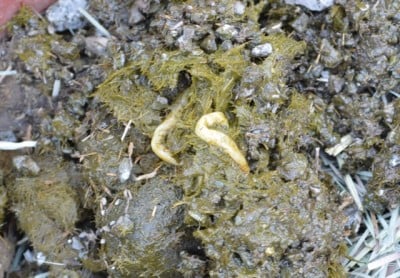
As you may already know, the tricky thing with worming equines nowadays, it that due to over-worming, many worms and parasites have become resistant to chemical wormers. So this is definitely something you should monitor with your vet (details below). There’s nothing worse than repeatedly giving your horse these strong drugs AND not getting rid of the unwanted visitors on top of the drug side effects! Contrary to popular belief, rotational worming has no effect on preventing parasite resistance, so you really need to work closely with your vet and utilize fecal (and blood) analysis.
Prevention vs. Treatment
Because of this, parasite prevention or control should be your first strategy in keeping your horse healthy. As veterinarian Marilyn Ward says in her book, Holistic Horsekeeping:
“Pasture management combined with regular fecal and blood exams can keep the use of chemical dewormers to a minimum and sometimes eliminate them altogether. It is also important to consider the overall immune system of the horse. A very healthy horse will be resistant to mild parasite burdens. I have been able to go as long as two years without needing to use chemical dewormers on my pasture horses.”
When we talk about ‘pasture management’ we’re talking about either removing manure daily from paddocks or pasture, or, having enough land to implement rotational grazing. This way, the horse is never forced to graze where it has pooped. Semi-feral horses, or horses regularly kept on pasture, will never eat where they shit. They intuitively know to avoid manure, or the grass growing around manure piles. The only manure that is safe to spread on fields is manure that has already been composted into soil, where composting raises the temperature above 40 degrees Celsius (100 degrees Fahrenheit) which kills the parasite at all life stages.
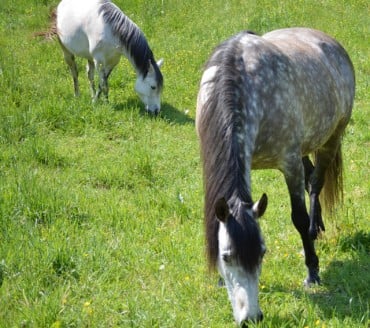
So to implement Cherry’s system, you need to have at least 2 fields; each of which will support your horses for a year. In this type of scenario, you would want to have at least 2-3 acres per horse.
However, as parisitologist Dr. Martin K. Nielsen points out, pasture rotation depends on the climate where you live. If you are in a moderate temperature climate (around 70 degrees Fahrenheit average summer temperature), where it is moist (rains a lot) then that is very advantageous to the parasites and they can survive a long time (e.g. Scandinavia, UK, Pacific Northwest). So in an environment like that, harrowing the manure (to break it up and spread it around the field) or mowing the grass (also spreads the manure around) is not a good idea as the climate will keep those parasites alive and happy throughout that entire grazing season.
So in that case, you would need to leave that field untouched for a full year, to let the manure get as hot as possible in the sun, and then as cold as possible (below freezing) in the winter, to reduce the parasite burden on that field. However, the best solution for moderate or rainy climates is to remove all the manure from the field and compost it. This is what I do and I hire local kids for cheap labor – they work with their friends and actually enjoy the task!
If you have very hot and dry weather (around 100 degrees Fahrenheit, eg. Arizona, Texas) during the grazing season, it wouldn’t take more than 3-4 weeks for the parasite burden to reduce substantially and then you could put the horses back on that field.
Nielsen recommends de-worming in the summer as that is the best time to interrupt the parasite burden on the horse. Because, interestingly, the majority of the parasites are not in the horse. During the grazing season, 80% of the parasites are outside the horse, in their pasture. So if you can do something to reduce the parasite burden in your fields, that is something that’s very effective and will work synergistically with de-worming.
Here’s a diagram to make understanding this process easier – although it’s pictured with a sheep, the same principles and rough lifecycles apply to equine worms:
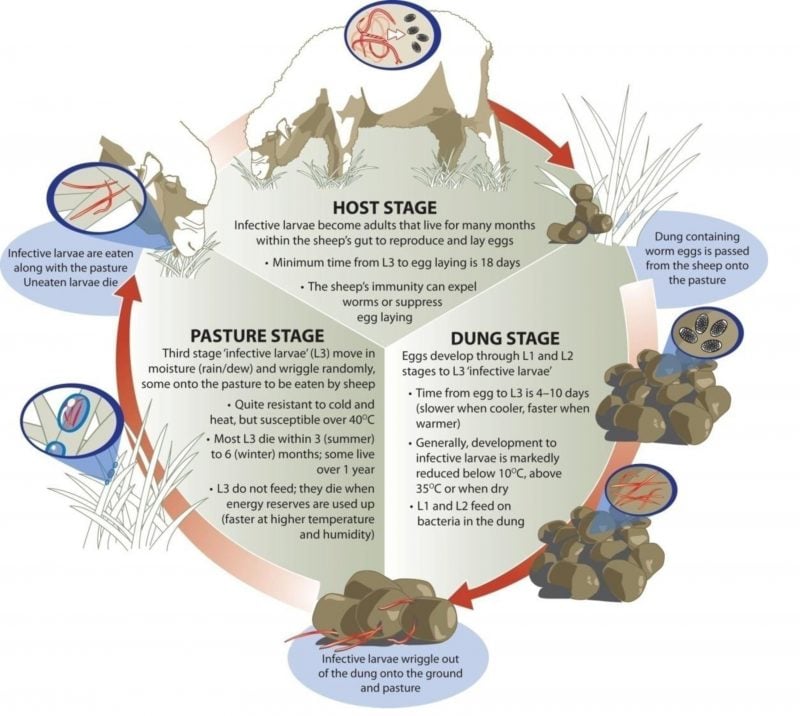
Mixed grazing with other species, like sheep, can be used for parasite control because the sheep will graze the horses’ defecation areas (those places where the horses have pooped and so won’t eat). By grazing these areas, the sheep eat the grass down low around the manure, which removes the shade and moisture, so the parasites are more exposed to heat and dry out – which makes it more difficult for the parasites to survive. It is fine for the sheep to ingest the equine parasites as they die inside the sheep. Of course, this method would only work where you have enough pasture to support both species. If you already have too many horses, and your fields are over-grazed, then this solution will not work at all.
Unfortunately, horses kept in stalls or with small paddock turnout may nose around in their own feces and eat their own, or other horse’s manure – creating highly infective environments. So again, the most effective thing you could do would be to remove their poop as quickly as possible.
What Happens If You Never Worm Your Horse?
Epona.tv has an 8-part video series with Dr. Martin K. Nielsen from the University of Kentucky’s Gluck Equine Research Center. He is one of the world’s leading horse parasitologists and the series covers every aspect of worming, resistance, management etc. – I highly recommend it.
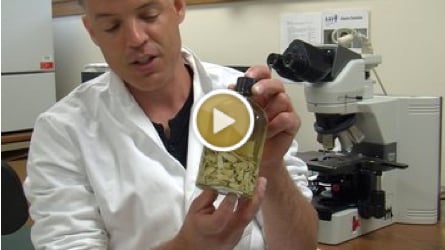
They see no disease associated with blood worms although some have the lesions. He also points out that these horses are not stressed by human handling/demands. Keep in mind, that for humans and animals, stress is a major cause of disease and ill-health.
Out of 25 horses in the herd, they’ve seen only 2 colic cases, and some diarrhea in the foals; the first winter is rough on the foals, but then they’re fine. Dr. Nielsen says:
“There’s always a degree of symbiosis between any parasite and the host. It’s not in the parasite’s interest to make that horse sick and the obvious question is to ask, well, is there a benefit for the host to actually harbor the parasites? It’s clear that it’s beneficial to the parasites; they’re dependent on it. But is there some plus for the horse to actually have the parasite? Are we doing something wrong by just trying to remove those parasites all the time?
If you look at humans, that very much seems to be the case. There’s now a lot of evidence behind what used to be The Hygiene Theory – there’s the whole concept of us in the Western world growing up in a too-clean environment and that seems to be associated with a higher risk of allergies and autoimmune disease. So In very broad terms, the immune system is lacking some stimulus, then it goes beserk because it never gets that stimulus and it goes out of control.”

As natural healing for gut diseases is my field of expertise, I am well acquainted with this theory, the Helminth treatment and also with autoimmune conditions. I certainly see the wisdom in recognizing that humans and animals have evolved for millennia living with a variety of microorganisms, including parasites. In fact, check out this list of normal worms and parasites found in pretty much every wild deer – who live full, healthy lives.
So although it’s very hard not to panic when faced with germs or parasites, we do need to keep in mind that our bodies actually contain more bacteria than human cells! And even for humans, there is a lot of evidence for NOT being so concerned about parasitic infection.
“The true objective of a worm control program is to optimize the health of horses — NOT to kill all worms.”
-Ray M. Kaplan, DVM, PhD, DEVPC, Department of Infectious Diseases, College of Veterinary Medicine, University of Georgia
For my own horses, I rely more on pasture management than chemical wormers. And if you live in a very cold climate, like most of Canada, then the long, frozen winters take care of a lot of the worm/parasite problems. When I had my horses in Alberta (dry and cold) we wormed once every year or two and in over a decade did not have a single health issue or colic problem.
Remember again, what Dr. Marilyn Ward says in her book, Holistic Horsekeeping:
“Pasture management combined with regular fecal and blood exams can keep the use of chemical dewormers to a minimum and sometimes eliminate them altogether. It is also important to consider the overall immune system of the horse. A very healthy horse will be resistant to mild parasite burdens. I have been able to go as long as two years without needing to use chemical dewormers on my pasture horses.”
So again, for ongoing parasitic treatment, we’re back to pasture management, targeted supplementation and low-sugar hay to maintain strong, vibrant health, and therapeutic probiotics to maintain a healthy, protective gut flora.
Herbal & Natural Wormers
I have a fascinating book called Wild Health: Lessons In Natural Wellness from the Animal Kingdom by Cindy Engel and there is an entire chapter in there on the various ways that wild animals seek out plants that provide natural parasite control for all manner of unwelcome guests. These plants work either through biochemical means, or by mechanical removal of worms which get ‘hooked’ onto the tiny barbs of certain leaves.

For example, Wild Health talked about how howler monkeys in Costa Rica consumed fresh figs and fig leaves to deworm themselves. As my friend has a fig tree, I got her to pick a basket of fig leaves and the remaining, small underripe fruit that, unfortunately, was all that was left at the end of the season. Out of my 4 horses, only 1 ate a fig, but then spat the next one out. And only 2 ate the leaves, but then only 2-3 leaves, and then refused the rest. No way is that enough to have any effect. However, I did observe one of my horses eating large amounts of maple tree leaves and the leaves of various other bushes he was able to reach over the fence.
So if I were able to have a variety of deworming plants or herbs growing in their pasture, perhaps the horses would self-select enough to control their parasite load. James French (founder of the Trust Technique) helped Hope Rescue set up their walking track (Paddock Paradise) and designed it so that in the middle is a “doctor garden” filled with various herbs so the horses can self-select as needed for various health issues.
Many blog posts have been written about diatomaceous earth as a natural worming agent for horses. However, Dr. Nielsen reports that, unfortunately – as he really hoped it would work – they carried out multiple trials using diatomaceous earth to worm horses and it was not effective.
I have used diatomaceous earth for a number of purposes and I suspect that a reason it doesn’t work in horses is that you probably cannot get the horse to eat the dosage required to be effective.

Likewise, I have used wild oregano oil gelcaps very effectively in dogs and cats, but have no way of getting a horse to ingest the required amount unless it were administered via a stomach tube. –Funnily enough, about 3 days after writing that last sentence, I had a spray bottle of diluted wild oregano oil (diluted 7:1 with olive oil) in my hand that I was using to treat abrasions and insect cluster bites and 2 of my horses took an interest in the bottle. Now, normally, animals get a whiff of wild oregano oil and they back hastily away. But these two started mouthing the bottle! So I sprayed a squirt into Audelina’s mouth (thinking she would take off like a shot as soon as the taste and heat hit her mouth), but she mouthed and licked and asked for more! I sprayed TEN squirts into her mouth (one at a time as I couldn’t believe it!) before she moved away.
My other horse, Montaro, showed the same interest and he accepted 6 squirts in the mouth. Zorra and Jax took one sniff and backed away. I will definitely be experimenting more with this and seeing how often they want it and also if they will accept a stronger dilution. This gets more interesting when you consider that their fecal egg count tests revealed Zorra to have zero worm eggs, and Jax to be a low shedder. Montaro is a medium shedder and Audelina is a very high shedder.
One other interesting bit of information from Dr. Nielsen, is that Ivermectin is actually a natural wormer! It is derived from a type of fungus, Streptomyces avermectilis, that works by paralyzing the worms, so they cannot grip into the intestines and thus can be excreted out.
Knowing this, when one of our horses needed worming, we used Ivermectin first, then followed it with a magnesium flush. We gave the horse a 10x dose of magnesium oxide to produce a laxative effect. I figured, “Hey, let’s take advantage of this paralytic period and flush out as many of those suckers as we can!” Interesting to note was that a 5x or 6x dose of magnesium had no effect – so I suspect the paralytic effect may have extended to the intestinal peristalsis (rhythmic contractions of the intestinal wall) as well, not just the worms. We followed this with a double dose of Equiflora probiotics daily for the next 7 days.
Fecal Testing For Worms & Eggs
Now that we’ve said all of that… what do you do if you have a horse that is in poor health, or with a swollen belly, or tends to colic, or is actually passing worms in his manure?
One of my rescue horses (Jax) passed actual, big (6″x1/4″) ascarid roundworms in his manure soon after he arrived. They looked like this:
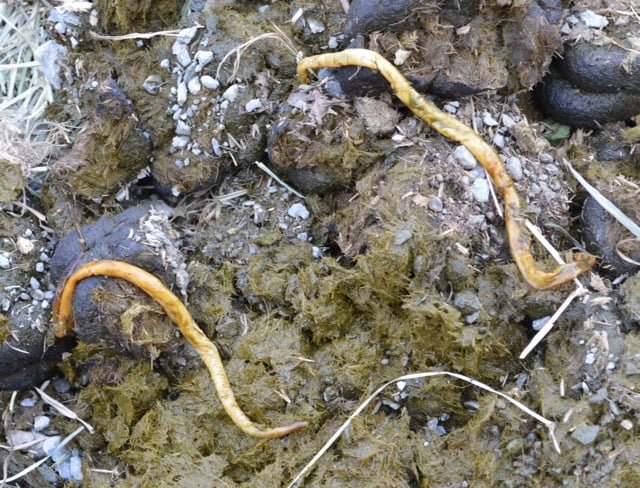
When I sent the photo to my vet, Dr. Ellen Kreuger, she confirmed that:
“From the pictures and your description, it looks like Jax has ascarids (Parascaris equorum). There has been some resistance of ascarids to ivermectin. So this is what you should do:
1. Collect a fecal sample* from all horses on the property. Bring it to the clinic for a fecal egg count.
2. Deworm with fenbendazole (brand name Panacur).
3. At the same time as deworming, remove all manure from their stall/turnout/pasture.
4. Bring in repeat fecal samples 2 weeks after deworming.
5. Bring in repeat fecal samples 10 weeks after deworming.”
*see below for the correct way to collect and store a horse fecal sample.
According to the Parasite Control Guidelines published by the American Association of Equine Practitioners (AAEP), there are four reasons to perform fecal egg counts:
- To evaluate the effectiveness of a dewormer by measuring eggs before and after its administration
- To monitor the egg reappearance period of the most recently administered dewormer
- To determine the shedding status of the horse at the time of sampling
- To determine whether parasite burdens in foals and weanlings are primarily roundworms or strongyles
Performing multiple parasite fecal counts also tells you whether your horse is a low, medium, or high shedder. As Dr. Lydia Gray writes:
“…fecal egg counts do not accurately reflect the amount of worms that a horse may be harboring. So ‘fecals’ should NOT be used to say “well, this horse had 0 eggs per gram or 25 eggs per gram or even 50 eggs per gram which is minimal so he doesn’t need to be dewormed.” What fecals SHOULD be used for is to say “well, this horse had less than 200 eggs per gram which classifies him as a low shedder and if the farm is managed properly he only needs to be dewormed once or twice a year because he’s not contaminating his area on the farm.” Keep in mind that to be classified as a low, medium, or high shedder takes multiple fecals, not just one, which is a good reason for repeating this simple, inexpensive test (and they make great holiday gifts, I might add).
Now for advice on putting all this technical information into practice where you board! Absolutely have several fecal egg count tests performed on your horse so that you know what classification – low, medium, or high shedder – she is. Next, work on getting buy-in on this better strategy to individually deworm horses from the barn owner, barn manager, trainer, other boarders, and anyone else whose opinion matters. Wouldn’t it be great to be able to identify a small herd of low shedders, turn them out together, and remove manure from their stalls, paddocks, and pastures on a regular basis so they could only be dewormed once or twice a year!”
Okay, so now that we’ve had that opinion from a general veterinarian, let’s look at this advice on the same topic from veterinarian parasitologist Dr. Martin K. Nielsen:
“There is no relationship between the egg count and the actual worm burden in the horse. A higher egg count does not mean more worms in the horse. I know this is difficult to digest, because that’s how we like to think about it. It doesn’t really matter what the egg count is. If you get above 500 eggs per gram, we found no association with the actual worm numbers in horses. We do know that horses below 200 eggs per gram tend to have less worms, than horses above 200. So there is that relationship which supports the idea of using the egg count to determine treatment. But it’s not unusual for a horse to have 100,000 worms, it’s normal. Most horses do extremely well with 100,000 worms, it’s not a problem for those horses. But we can also never rule out that a single horse can suffer some health-related issues to the worms.”
As Dr. Nielsen carries out ongoing clinical studies on a large number of herds, kept in various environments, I would tend to focus on his assessment and interpretation of the fecal egg count test results. However, I do like Dr. Gray’s advice on managing herds in boarding situations to decrease the usage frequency of chemical de-wormers.
It is also important to collect, store, and transport your horse’s fecal sample correctly to ensure the most accurate test result.
How to collect an equine fecal sample:
- Collect 1-2 fecal balls from your horse’s stall or pasture.
- Place the sample in a sealed container (Ziploc baggie, Tupperware, etc.) and label with horse’s name.
- The sample immediately needs to go into the refrigerator, or in a cooler box on ice. The sample temperature must not go above 5 degrees Celsius. Otherwise, the eggs will hatch and you will not get an accurate egg count – as the test detects worm eggs, not hatched worms. In the winter make sure it is not frozen. The fecal sample may be kept in the refrigerator for up to 2 weeks if needed. Pack samples on ice in a cooler box to transport to vet’s clinic. Do not freeze the sample.
Again, once you have some fecal egg counts established, you should be able to work with your vet as to which worming medications are likely to be most effective for your horse, climate, time of year, etc. And also, which horses should be pastured or turned out together for long-term worming management.
When it comes time to actually give your horse a worming paste, if your horse is fairly compliant, then here’s a good, quick tutorial:
But if your horse is difficult, or semi-feral, then this next method would work much better. Although, I have to say, I feel like he is rushing things and I would wait longer between “try’s”, I would also completely release the halter in between, and I would also have the first syringe contain peach or diluted apple juice, or apple sauce (trick from my equine chiropractor), so the horse says, “Hey, this is good!” Then use the paste wormer for the second time you syringe. Or you could use the same method I use to worm my horses!
What About Quest Plus Moxidectin De-wormer?
You may have heard stories from friends, vets, and various forums on the Internet that Quest Plus (containing moxidectin) is not a safe de-wormer and has caused the deaths of numerous horses.
Some maintain the deaths were due to over-dosing; as moxidectin must be used with great caution to administer the correct amount for the horse’s weight. The best summing-up I found of the controversy was posted on a message board:
“I won’t use Quest for several reasons. The FDA Center for Vet medicine keeps records for product related injuries. In 1997, they had 159 regarding Quest and it was #4 in the list for complaints that year. By 1998, there were 487 complaints making it #2 in the list. Complaints are received from both vets and consumers, documented and investigated. It is known that horses with heavy worm loads can be killed by it and because it requires such precise dosing, too little does nothing and too much can be lethal. It’s also been linked to fetal deaths. If the horse has a heavy worm burden, it should be wormed with something like Panacur first and then Quest a couple of weeks later. The thing is that when Quest first came out, people weren’t aware of this and probably still aren’t and that’s why horses are dying, not just mini’s.
Much has been made about the posting on the Fort Dodge website regarding internet rumors about the product and that’s their right to defend themselves. However, the FDA shows that there were a lot of complaints regarding the product and that there was also a large jump in numbers reporting. I should also point out that the active ingredient in Quest – moxidectin – was also used in ProHeart which was for heart worms in dogs. It was also made by Fort Dodge and it was pulled off the market by the FDA because by 2004 they had received 5552 reports of injuries to dogs and around 500 deaths. Same drug, same company – no thanks!”
I double-checked her reference to the FDA recall of ProHeart for dogs and it did indeed check out as correct.
When I looked for information about Quest on the FDA website, I found this very interesting ‘misleading information’ letter. The interesting highlights from it are that Fort Dodge Animal Health (Wyeth) is failing to disclose risk warnings in their promotional literature. The FDA feels these are some of the most important risk factors that Fort Dodge should be making clearer to consumers:
In the Warnings section:
Extreme caution should be used when administering the product to foals, young and miniature horses, as overdosage may result in serious adverse reactions. Do not use in sick, debilitated, or underweight animals. Not for horses or ponies intended for human consumption.In the Precautions section:
[This product] has been formulated specifically for use in horses and ponies only. This product should not be used in other animal species as severe adverse reactions, including fatalities in dogs, may result.“Care should be taken to avoid the release of significant volumes of moxidectin into either ground or free-running water since moxidectin may be injurious to aquatic life. SURE-DIAL® syringes and their contents should be disposed of in an approved landfill or by incineration.”
When I look at the damage this drug is capable of across species, it certainly does not make sense to voluntarily give it to my horses!
The Next Steps for My Herd
For me, I followed Dr. Kreuger’s advice for establishing fecal egg counts for all my horses. Since my 3 rescue horses had already received treatment with Ivermectin, I felt confident in following her advice to deworm with Panacur (fenbendazole).
During the deworming period I confined them to the paddock (where their hay is off the ground in slow feeders and manure is removed daily), and one of the fields with almost no grass left in it.
I hired teenagers to remove every bit of manure from the other 2 fields, so that by the time we were finished the 2-week deworming/shedding period, and the situation was under control, I could turn them out into 1 of the big fields that was clear of manure, for the remainder of that fall, winter and spring.
The other big field was left closed until the following summer, but as it was cleared of manure first, the chances for reinfection from that field would be greatly lowered.
Remember, prevention via good pasture management combined with herbs, targeted supplementation, low-sugar hay and therapeutic probiotics to build your horse’s immune system are the golden keys to keeping your horses healthy with a normal (manageable) parasitic load!
As Dr. Nielsen says, “A horse’s immune system can reduce the level of contamination, so although the number of worms inside the horse remains the same, the fecal egg count will go down. The next thing that will happen is the immune system will reduce the number of live worms in the intestines.”
If you then take care of the parasite burden in your pastures (remember, up to 80% of parasites are not inside the horse, but in their environment), you may be able to go years without worming your horses.
And if you have carried out a series of fecal egg counts to determine which horses are low or high shedders, then you can look at segregating those high shedders during grazing season – and also not worming all your horses indiscriminately.
After doing all this research and learning even more about the intelligence of equine parasites – they evolve similarly to viruses and bacteria and genetically mutate to become resistant to medication – I personally, will focus my efforts on building and supporting my horses’ immune systems (in addition to the elements listed above, I also do not vaccinate my horses – as this also greatly increases the burden on their immune system – see Holistic Horsekeeping by Dr. Ward for more on this topic) and reducing the fecal infection burden in their environment (regular removal of manure and not feeding on the ground where there is manure around).
I may not use a chemical wormer again unless a horse develops signs of disease. And I’m going to keep experimenting with wild oregano oil, olive leaf extract and other herbal substances that may naturally assist my horses in controlling their parasite load. Of course, if I find something that works well, I’ll blog it here!
UPDATE: Dr. Nielsen is currently conducting research on a promising new natural worm treatment that uses crystal proteins produced by strains of Bacillus thuringiensis soil bacteria to kill the worms.

Jini Patel Thompson is a natural health writer and Lazer Tapping instructor. She began riding at age 2 in Kenya, and got her first horse at age 8 in Alberta, and so continues a life-long journey and love affair with these amazing creatures.





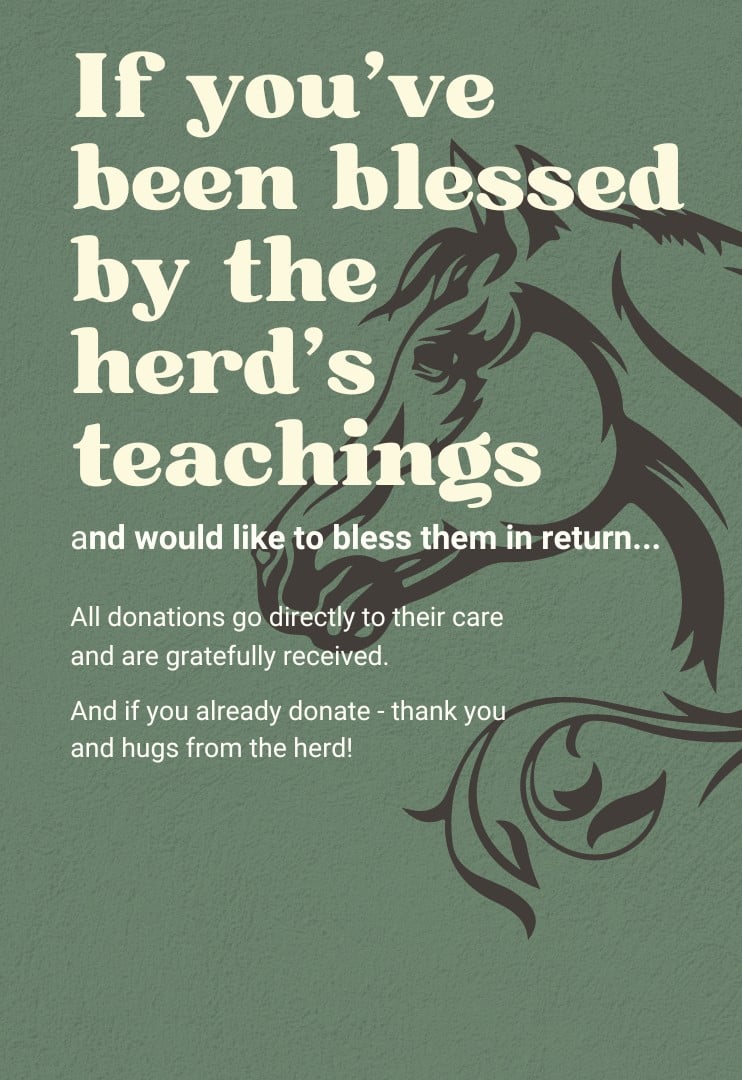


Pingback: AGRIMECTIN IVERMECTIN PASTE 12 TUBES WORMER BOTS PARASITES 1.87% |
Yes it is possible to worm with a herbal wormer, I formulated one several years ago and it has undergone trials and the efficacy is proven, it has been used by my clients for over 15 years and due to the way it works there is no resistance build up and no side effects, other than t is a very good conditioning powder as well. Name NoVerms
That’s wonderful Ellen! Can you provide links to the clinical trials? I’m very interested to check it out!
Please provide info on the clinical trials! I’m sure loads of us are interested. We’re all looking for alternatives with a proven track record.
Hi Jini, I was wondering if you’d be open to trying a herbal wormer I have created over 2 years and hundreds of hours of research. I am happy to send you a free bag to try and all I want is your honest feedback.
I appreciate your attention to detail, the fact that you research things like diatomaceous earth not being effective at all (outside of some fowl) and your honest approach.
I personally chose olive leaf over oregano for several reasons in my wormer but I was very intrigued by your horses reaction to the oregano. It is my firm belief that given the right atmosphere and left natural horses will generally choose what is best for them.
I think I would go with Olive leaf too – more chance of it being accepted for sure! And yes, I’d love to try a bag of your herbal wormer and will give an honest review of it. I took a look at your site and I really like your ingredient list.
I will also offer it straight to the horse who asked for the oregano oil straight (her FEC showed the highest count when she first arrived at my place) and see what she thinks. I offered them organic Neem leaf and no one would eat it – they lipped at it, or took a bit and let it fall back out of their mouths. Then this horse (Audelina) told me to put some flax oil on it. I did and all of them ate it. Their wisdom never ceases to amaze me.
You can either email me, or send the sample to this address:
https://listentoyourhorse.com/contact/
Thank you and excited to try it!
Thank you for all the information. You obviously put many hours into research.
My husband and I use only natural healing and prevention as well as for all our farm animals, except our horses. We found worms, viruses and bacteria do not build an immunity against a natural healing herb. Whereas, commercial, chemical based products, allows worms, viruses and bacteria to build an immunity and even mutate. Reluctantly, we have been using commercial pastes for our horse and would love to get away from them. I have yet to find a natural product that works.
I really like your statement about managing instead of eradicating worms.
I am going to try fennel seed and the oregano/olive oil spray.
Thank you so much for your article.
Keep us posted Stephanie 🙂 I also offered the horses Neem leaf (another natural wormer) and none of them would eat it. But then Audelina said, “Put some flax oil on it” so I did and 4 of them ate a decent amount! So just keep testing things and listening to your horses.